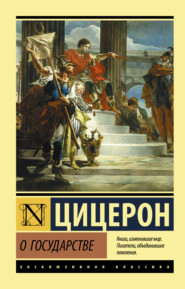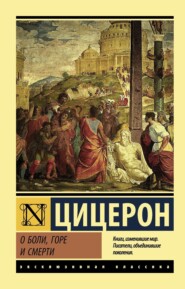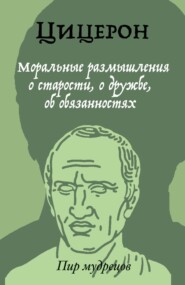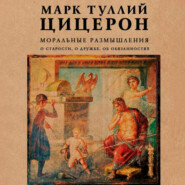По всем вопросам обращайтесь на: info@litportal.ru
(©) 2003-2024.
✖
The republic of Cicero
Автор
Год написания книги
2018
Настройки чтения
Размер шрифта
Высота строк
Поля
[Two pages wanting.]
XXXI. * * * * * * every government partakes of the nature and will of him who administers it. So that in no other state, save where the power of the people predominates, has liberty any home. Liberty the sweetest of all blessings, and which if it is not equal for all, is not liberty. For what equality can there be, I do not mean in kingdoms where slavery has no doubtful character: but in those states where all are nominally free: there indeed they give their votes, confer commands, magistracies and are solicited and intreated. But in truth they only part with that, however repugnant it may be to them, which must be conferred: things which they cannot retain, which is the reason why others seek to possess them. For they are invested with no command, have no public authority, nor are called to be judges in the tribunals: privileges which belong either to ancient families, or are purchased by money. Among a free people however, as at Rhodes or Athens, there is no citizen who * * * * *
[Two pages wanting.]
XXXII. Some assert, that when one or more in a state becomes conspicuous by his opulence or riches, disdain and pride soon break out: and the weak and indolent yield and bend under the arrogance of riches. But if the people are able to preserve their rights, they think no condition of things could be more excellent, more free, or more happy. For in their hands would be the laws, the tribunals, war, peace, treaties, and the properties and lives of all the citizens. This sort of government they think is properly called one republic, that is the common interest of the people. Wherefore it is, that the people are wont to restore commonwealths to liberty from the domination of kings, and patricians; not that kings are believed to be necessary to a free people, or that the better class are the source of power and wealth. And they deny that these advantages should not be conceded to a free people on account of the excesses of uncivilized nations: for where the people are unanimous, and every thing tends to the public safety and liberty, nothing can be more unchangeable, nothing more firm. Unanimity in such a commonwealth is very easy, where the common effort is for the public good. But from opposing interests, where one man clashes with another, discord arises. Wherefore when the senate had possession of the government, the condition of the state was never sound. In kingdoms the disadvantages are still greater; of them Ennius said
“No holy confidence or fellowship reigns there.”
Wherefore as the law is the bond of civil society, and equal rights form that of the law, by what power can a community of citizens be maintained, where their condition is not an equal one? If therefore it is not expedient to equalize fortunes; if the powers of mind cannot be equalized in all, certainly then an equality of rights ought to exist, among those who are citizens of the same republic. For what is a state but a community of rights? * * * * *
[Two pages wanting.]
XXXIII. * * other governments however are deemed by them not to deserve those names, which they have chosen to arrogate to themselves. For why should I call a man who is greedy of rule, or of the sole command, and who is trampling upon an oppressed people, king, which is the title of the good Jupiter, rather than tyrant? A tyrant may be clement as well as a king may be oppressive; the matter really interesting to the people is, whether they are to serve under a gentle or a severe master: for as to being any thing but servants, that is not to be avoided. How could Lacedemon, when she was thought to excel in the science of government, possess only good and just kings, when she was obliged to take any king who was sprung from the royal blood? And the better class, who can endure them, who have arrogated to themselves in their own assemblies, a name not conceded to them by the people? For who is the man to be pronounced best, in learning, in the arts, in studies? * * * * *
[Four pages wanting.]
XXXIV. * * * * If it was done by lot, the government would be overthrown; like a ship, at whose helm, some passenger taken at hazard was placed. A nation can entrust its affairs to whom it may choose; and if it wishes to remain free, it will choose from among the best. For certainly the security of states is found in the counsels of the best citizens; especially as nature has not only ordained that they should preserve an influence over the weak by their conspicuous virtue and courage, but also that the weak should resign themselves to the government of great minds. This most desirable state of things, they say, is prevented by the erroneous opinions of men who, through ignorance of that virtue, which belongs to but few, and is seen and appreciated only by few, deem those who are sprung from a noble race, or who are opulent and wealthy, to be the best men. Under this vulgar error, when the power, not the virtues of a few, have got possession of the government; those chiefs tenaciously preserve the title of better class; a name however to which the substance is wanting. For riches, titles, and power, devoid of wisdom, of the knowledge of self-government, and that of the government of others, exhibit nothing but insolent and disgraceful pride. Nor can the condition of any city be more deplorable, than where the richest men pass for the best. But what can be more delightful than a state virtuously governed? What more illustrious than the man, who while he governs others, is himself the slave of no bad passions? Who, while he calls upon the citizens to observe the regulations he has formed, lives up to them all himself? Nor imposes any laws upon the people, which he himself obeys not, but who presents his whole life to his fellow citizens as one unbroken law. If one man could suffice to all things, there would be no need of many; and if all men could perceive what is best, and consent to it, no one would require any chiefs to be elected. The difficulty of coming to wise determinations, has transferred the rule from one king to many persons; and the error and rashness of the people, from the multitude to a few. Thus between the obstinacy of one, and the temerity of many, the better class have possessed themselves of the middle and least turbulent of all the situations: by whom if the commonwealth is well administered, the people relieved from all care and thought, must necessarily be happy: enjoying their independence through the labours of those, whose duty it is to preserve it to them; and who ought never to permit the people to think that their interests are neglected by their rulers. As to that exact equality of rights, which is held so dear by a free people; it cannot be preserved: for the people themselves, however free and unrestrained they may be, are remarkable for their deference to many persons; and exercise a great preference as it respects men and dignities. That which is called equality also, is a most unjust thing in itself: for when the same honour is enjoyed by the high and by the low, through a whole people, that very equality must be unjust; and in those states which are governed by the better class, it can never happen. These, Lælius, and some other reasons resembling them, are wont to be urged by those who chiefly praise that form of government.
XXXV. “But which, Scipio, among those three, do you chiefly approve of?” said Lælius.
Scipio. “You do well to ask, which chiefly of the three, since separately I do not approve of any of them; but should prefer to every one of them, a government constituted out of all three. But if one of them for its simplicity may be admired, I should approve of the kingly form, and give it the highest praise. For the name of king calls up at once the idea of a father, consulting with his citizens as if they were his own children; and more anxious to preserve them, than to reduce them to slavery: it being a great advantage to the weak to be sustained by the exertions and by the foresight of one pre-eminent and good man. Here however the better class profess to do the same thing to more advantage, and say there is more wisdom with numbers than with one, and at the same time equal justice and faith. But the people call out with a loud voice, that they choose neither to obey one nor many; that nothing is sweeter to the beasts of the field than liberty, which is wanting to all who serve either under the better class or under a king. Thus on the score of personal attachment, kings attract us. The better class by their wisdom; and liberty on the side of the people. So that in making the comparison, it is difficult to say which is preferable.”
L. “I believe it,” said he, “but if you leave this point unfinished, the other parts of the subject can scarcely be cleared up.”
XXXVI. S. “Let us imitate therefore Aratus, who in his introduction to a discourse upon high matters, thought it best to begin with Jupiter.”
L. “Why with Jupiter? and what has this discussion to do with the verses of Aratus?”
S. “Insomuch, that the opening of our debate may be honoured with the name of him, whom all, learned and unlearned, consent with one voice, to be the one king of all the gods and men.” “What then!” said Lælius. “What do you believe in but the things which are before your eyes?” replied he. “This opinion has been established for the conduct of life, by those who have had the direction of public affairs; that the belief might prevail, that one king ruled in heaven, who with his nod, as Homer says, could tumble down Olympus; and that he should be considered as the King and Father of all. Great is the authority for it, and many the witnesses, inasmuch as all have concurred in it. Nations too have agreed, as we find in the decrees of princes, that the regal form of government was most excellent, since they imagine the gods themselves to be under the government of one king. And if we have been told that this and similar opinions have sprung from fables and the errors of the ignorant, let us listen to those who may be considered almost the common teachers of erudite men; who as it were, saw these very things with their eyes, which we scarcely are acquainted with, when we hear of them.” “And who are they?” said Lælius. “They,” replied he, who in their investigations of the nature of all things, have perceived a design in the universal structure of this world * * * * * *
[Four pages wanting.]
XXXVII. * * * * * * “But if you desire it Lælius, I can give you authorities in no wise barbarous, nor of too remote an antiquity.”
L. I should be glad to have them.
S. You are aware that it is now somewhat less than four hundred years since this city has been governed without kings.
L. That is true; rather less.
S. What then are four hundred years, for the age of a city or state; is it such a long period?
L. It can hardly be called an adult age.
S. Then there was a king in Rome four hundred years ago?
L. And a very superb one.
S. Who before him?
L. A most just one; and from that period up to Romulus, who reigned six hundred years from the present time.
S. Then he is not so very remote.
L. Not at all. The institutions of Greece were already on the wane.
S. I submit to you now, whether Romulus was the king of a barbarous people?
L. If as the Greeks say, all men were either Greeks or Barbarians; then I am afraid he must be esteemed a king of a barbarous people. But if that epithet is appropriate to a difference of manners, rather than to languages, I think the Greeks not less barbarians than the Romans.” “In relation to the matter of which we speak,” said Scipio, “it is intelligence we are looking for, rather than men. If a discreet people therefore, not of a very ancient period, have preferred the government of kings, I am availing myself of testimony which cannot be deemed savage, uncivilized, or of a barbarous antiquity.”
XXXVIII. “I perceive Scipio,” said Lælius, “that you are sufficiently provided with testimony. But with me, as with good judges, sound argument prevails more than witnesses.” “Make use of an argument then,” replied Scipio, “which your knowledge of yourself can suggest to you.” “What knowledge,” said he.
S. Why as when by chance it happens to you to be angry with some one.
L. That occurs oftener than I could wish.
S. What! when you are in anger, do you suffer your mind to fall under the domination of that passion?
L. No, so help me Hercules. I rather imitate Archytas, the Tarentine; who on arriving at his country house, and being greatly offended at perceiving his orders had been disobeyed, “You are a miserable wretch,” said he to his farmer, “and I would have you flogged to death if I were not angry.” “Excellent,” said Scipio. “Archytas wished to calm his anger by reflection, considering that degree of it which was not under the control of reason, to be leading on to a sort of sedition of the mind. To it add avarice, ambition, the passion for glory, and for sensual pleasures; and it will appear that there exists in the minds of men, a sort of regal controlling power, to wit, reflection. For that is the best part of the mind, and where its authority prevails, there is no room for sensuality, for anger, or for rashness.
L. So it is.
S. Do you approve therefore of a mind so disposed?
L. There is nothing I admire more.
S. Then you really do not think, reflection being driven away; that voluptuousness or the angry passions, which are without end, should have the mastery in all things.
L. Indeed I can conceive of nothing more wretched, than such a state of mind; nor of a man more debased than when under such government.
S. You prefer then all parts of the mind, to be under some government, the government of reflection?
L. I certainly prefer it.
S. Why therefore do you hesitate in your opinion about public affairs; where if the administration is transferred to many, there will be no one, as I now understand it, to take the command. And it seems that if authority is not one thing, it is nothing at all.
XXXIX. “I would ask,” said Lælius, “of what consequence it is to us, whether one or many, if justice is dispensed by the latter.” “Since I find Lælius,” said Scipio, “that my witnesses have made no great impression on you, I shall not desist from making use of yourself as a witness to prove what I say.” “Me,” said he, “in what way?”
S. Why adverting to the directions you so earnestly gave to your family, when we were lately at Formianum; to obey only the orders of one person.
L. Oh! my farmer!
S. Well, at home, I suppose, several are entrusted with the management of your affairs?
L. No, only one.
S. What, your whole establishment! does no one but yourself manage it?














